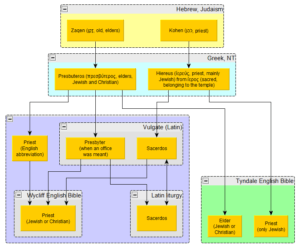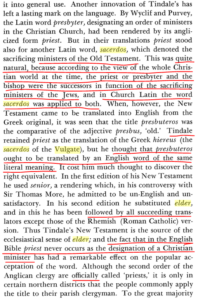How two Greek words (for priest and elder) became confused and how this still affects us today. This subject is kind of controversial between Catholics and Protestants, but that is no reason to ignore it, on the contrary. The subject has often been looked at from one point of view only. This has led either to conflict or to a vulnerable kind of tolerance, namely without knowing what we actually tolerate.We will not only use etymology (how a word developed), because that does not always explain how words are used. We can either start from the English word “priest” of from the Hebrew word “Kohen”. If we start from the present and work our way back, it can easily get even more confusing, so we will start with the Hebrew and Greek.
When (koinè) Greek became the dominant language in Palestine, the Jewish word Kohen (priest) was not hard to translate. The Greek hiereus could mean either a Jewish or a Greek priest or any priest who was in the business of bringing sacrifices or in any way trying to obtain blessings from the gods. This was, therefore, the word that was used both in the Septuagint, the Greek translation of the Old Testament, and in the New Testament when a Jewish priest was meant. By the time of Christ the Roman Empire was spreading. Christians in Palestine would, for some time to come, continue to use Greek and Aramaic (the variety of Hebrew that Christ spoke). After the destruction of Jerusalem in 70 A.D. and the rapid expansion of Christianity outside Palestine, the most important languages became Latin, Greek (East) and Aramaic (still used in the Syrian Orthodox Church).
However, it would not be until the 4th Century that a Latin version of the Bible (Old and New Testament) was produced, called the Vulgate. In Latin, the word used was sacerdos. This comes from sacer (holy, sacred) and a non-Latin root, meaning to do, so it referred to someone performing sacred acts.[1] For the Romans, by the way, this did not refer to a priest, for Rome had no priestly caste. In a sense, every citizen was a priest, who could try to appease the gods himself, but he would not be called a sacerdos. It is worth noting, however, that by the 3rd Century, Christian bishops carried this designation as an extra title (the first one being episcopus, overseer, bishop, as in Greek).
So far, so good. Whenever a Jewish priest (Kohen or hiereus) was mentioned in the Bible, this was rendered as sacerdos. Bishops were also using this as a title, although they were not Jewish priests. Still, that was not unreasonable because they were presiding over the Eucharist, which was indeed a holy act. In the meantime, not even the Vulgate mentioned it as a title of any individual Christian leader or minister! What Catholics are saying is that this does not matter, because the elders (Greek presbuteroi, Latin presbyters) or overseers (Greek episcopoi, bishops) as they are mentioned in the New Testament performed the same sacred acts as their successors in the 3rd Century, who where (in the liturgy) called sacerdos. We cannot possibly include a study of the development of the Eucharist here, but let us say Catholics have an important point.
Christianity probably reached Britain around the end of the 2nd century. This is sometimes called “Celtic” Christianity. The population would have used the Old-English word ‘priest’ to indicate a Christian minister. This word, although not the best translation of sacerdos, worked because it came from the same root as presbyter. You can see that the p, r, s and t, 4 of the consonants in presbyter, return in the word priest, and they do so in the same order (leaving out the b and the r). Priest no longer only meant ‘elder’[2] and was already in use for non-Christian priests. The word was not used in a typical church service, as that would have been in Latin. When it became time to translate the Bible and the liturgy into English (Wycliff translation from Latin), priest could no longer just be considered as a popular name. Now the two words (sacerdos and presbyter) officially became synonyms. It then became more evident that Jewish priests, Christian ministers, bishops, and druids had all been lumped together. Note that this would be corrected in the later Tyndale translation, which used the original Greek text and would become very influential. Jewish priests were called priests and Christian leaders were only called elders or overseers (bishops). However, the liturgy had also been translated into the vernacular, complete with its images borrowed from the Aaronite priesthood, so there were still sacrificial as well as heathen connotations, which did not please the Reformers.
I think those Reformers had a point as well. The Christian ministry is hugely different from the Old Testament priesthood as well as from the priests of other religions. The fact that some kind of Reformation was needed, was not contested, not even by Roman Catholics. Certain excesses which had grown in the Church may well have been partially due to linguistic choices and confusions. Subtle intentional or unintentional variations in terminology have been shown to have great influence on our thinking and behaviour. In retrospect, this raises even the question if the equation of presbyter and sacerdos (using them as synonyms) had ever been a good idea. If the New Testament authors had wanted these two concepts to mean the same, then presbyter and hiereus would have been used interchangeably in the New Testament, which is not the case.
As Allan K.Jenkins and Patrick Preston wrote, “In relation to the Greek, Tyndale was correct in pointing out that the various writers of the New Testament consistently used presbuteros in relation to ministers within the church and never hierus (‘priest’), which is used only in reference to the Jewish priesthood” (Biblical Scholarship and the Church: A Sixteenth-Century Crisis of Authority, p. 97.)
Mind you, I am not opposed to the use of the word ‘priest’ per se, but I merely see a large risk that the term will continue to be misunderstood. This, in turn, seems to be an important factor in keeping the two major camps of Western Christianity divided. Within the Anglican Church these camps somehow coexist, but to coexist does not mean being united or understanding where the other comes from. I hope this overview may prove to be a small contribution towards more mutual understanding.
[1] Some sources interpret sacerdos to mean ‘one who gives a holy thing’, which would then be a reference to the distribution of the Holy Sacrament. This is very unlikely, though, as the citizens of the Roman Empire did not distribute consecrated bread, but did sometimes bring sacrifices to the gods.
[2] A priest or sage was usually a wise old person, so the step from elder was not too great.







Leave A Comment